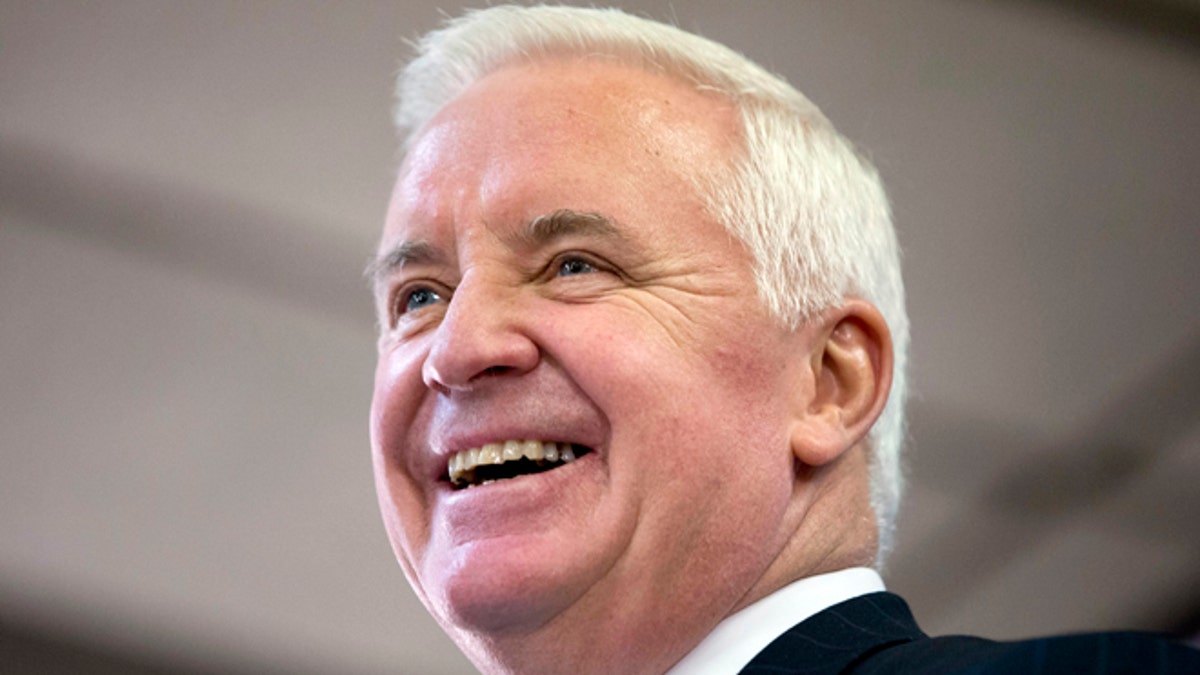
FILE: Nov. 7, 2013: Pennsylvania GOP Gov. Tom Corbett in Philadelphia, Pa. (AP)
Democrats looking to make gains in the 2014 gubernatorial elections are using a possible minimum wage increase as a way to win support among voters, following a wave of protests on the issue this year.
While Republican governors are expected to campaign on issues such as the rocky rollout of ObamaCare and nationwide discontent with Washington, Democrats seeking to unseat them are lobbying for an wage increase in the early stages of their campaigns, the Associated Press reports.
Democrats across the political spectrum have lobbied for a higher minimum wage this year, after Obama got the ball rolling on the issue by calling for an increase in his February budget speech. Since then, union-organized demonstrations in front of profitable mega-chains such as Wal-Mart and McDonald's have kept it in the public eye.
Senate Democrats have also pushed for a minimum wage increase going into 2014. Their proposal would raise the minimum wage by 40 percent.
In Pennsylvania, championing a minimum wage increase is already popular among the big field of Democrats vying to challenge the re-election bid of Gov. Tom Corbett.
Now, Katie McGinty, a onetime environmental policy adviser to the Clinton White House and Corbett's Democratic predecessor, is distinguishing herself by telling audiences and potential donors that she was the first Democrat in the Pennsylvania field to make it an issue.
"This is core for me," McGinty said. "I think it is fundamentally true across the centuries that one of the things that can really bring a nation down is the increasing chasm in terms of income."
Thus far, the Republicans whom Democrats view as most vulnerable aren't changing their minds and supporting a wage hike.
In addition to Corbett, the Democrats' list of most vulnerable includes Maine's Paul LePage, Michigan's Rick Snyder and Wisconsin's Scott Walker. Florida's Rick Scott and Ohio's John Kasich might be insulated because their states' laws boost minimum wage with inflation and Iowa's Terry Branstad, New Mexico's Susanna Martinez and Nevada's Brian Sandoval aren't viewed as sufficiently endangered.
All of those governors won a first term in the national Republican sweep of 2010, and most have had strong Republican representation in their legislatures to support them.
But LePage was tasked with facing a Democrat-controlled legislature, and in July he vetoed a bill to incrementally raise the state's minimum wage.
For his likely Democratic challenger, U.S. Rep. Mike Michaud, increasing the minimum wage is an issue the onetime paper mill worker from northern Maine discusses often, said campaign adviser David Farmer.
"He is closely aligned with working- and middle-class families," Farmer said. "He's not a millionaire."
Still, it would not be unheard of for a Republican to advocate a minimum wage increase. New Jersey Gov. Chris Christie, who leads the Washington, D.C.-based Republican Governors Association, and New Mexico's Martinez each vetoed their legislature's minimum wage bill, but not without making a counteroffer of a more modest increase.
Republican governors are focused on lightening tax and regulatory burdens for businesses to improve wages, said Jon Thompson, a spokesman for the Republican Governors Association. But he also seemed to acknowledge the occasional political necessity for Republicans to embrace a minimum wage increase.
"It's complicated because there are some states that a minimum wage increase could be more helpful and useful than other states," Thompson said in an e-mail.
For Democrats, campaign advisers and strategists say there's no mandate from national party leaders to wield the issue as a weapon next year. But there's no denying its popular and salient to the political battlefield, said Danny Kanner, spokesman for the Democratic Governors Association.
"The defining issue in every single one of these races is who is fighting for the middle class," he said.
Democrats are pairing their advocacy of a minimum wage increase with criticism of cuts to corporate tax rates, public pensions or education aid that Republican governors pushed through. They also contend that it'll revive the economy by flushing more money into the hands of consumers who spend it and reduce reliance on food stamps or other government programs for the poor.
If vulnerable Republicans aren't budging on the issue, neither are the business groups that tend to back them. The U.S. Chamber of Commerce warns that small employers will have the hardest time absorbing higher labor costs, while the National Federation of Independent Business warned of job losses.
"We're not going to waver," said NFIB spokeswoman Jean Card. "It's the kind of thing that sounds good, but rarely are polling questions backed up with the kind of economic downside that's inevitable."
The Associated Press contributed to this report




